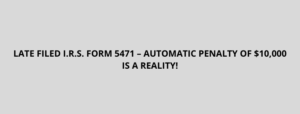FBAR Penalties Could Be Lessened Under New IRS Guidelines
According to the IRS, “if you have a financial interest in or signature authority over a foreign financial account, including a bank account, brokerage account, mutual fund, trust, or other type of foreign financial account, exceeding certain thresholds, the Bank Secrecy Act may require you to report the account yearly to the Department of Treasury by electronically filing a Financial Crimes Enforcement Network (FinCEN) 114, Report of Foreign Bank and Financial Accounts (FBAR).”
In other words, anyone who has money in a foreign bank account that exceeds $10,000 at any time during a given year will need to report that income to the IRS via an FBAR. However, recently, the IRS issued some new guidance regarding the penalties for those who don’t file an FBAR. According to reports, the IRS released a statement that noted: “For each year for which it is determined that there was a willful violation, examiners must fully develop and adequately document in the examination work papers their analysis regarding willfulness.”
For any case that involves willful violation for several years, it is up to the examiner to recommend the penalty length for each year the violation was determined to be willful. The IRS stated that typically the total penalty for the combined years under examination would not exceed ‘50 percent of the highest aggregate balance of all unreported foreign financial accounts during the years under examination.”
Meantime, an examiner can recommend more or less than the 50 percent threshold, but the total penalty cannot “exceed 100 percent of the highest aggregate balance.” There are obviously many possible scenarios and each case will be treated separately on its own merits and circumstances. The bottom line is you should still report your FBARs each year and report them on time. If you need help planning for and filing your FBAR then contact GROCO today at 1-877-CPA-2006, or by clicking here.
Ten Ways to Involve Your Children in Philanthropy
Ten Ways to Involve Your Children in Philanthropy Derek Ferriera and Martin Johnson Updated: 5/23/2013 Through your own philanthropic generosity—whether volunteering, supporting a charity as a benefactor, attending fundraisers or setting up a family foundation—you are educating your children about your values and teaching them to be generous. While you may identify your philanthropic values…
Business Law | Gautam Dutta
Business Law | Gautam Dutta Transcription: Announcer 0:00 Welcome to American Dreams keys to success with your host, Alan Olsen. Alan 0:06 Welcome back. We’re here today visiting with Gautam Dutta. And formerly an SEC attorney practicing law here in the Bay Area. And we’re talking about your days at the SEC. And during the…
Late Filed IRS Form 5471 – Automatic Penalty of $10,000 is a reality!
IRS Form 5471, Information Return of U.S. Persons With Respect to Certain Foreign Corporations, has been a filing requirement for many decades if a U.S. taxpayer owns a significant amount of a foreign corporation. The form has gotten ever longer over the years and is now long and difficult to complete, and in some cases,…
Should You Invest in Residential or Commercial Properties?
Should You Invest in Residential or Commercial Properties? Most people in Northern CA started investing in real estate by buying their own homes. And most have made money as real estate in Northern CA has continued to appreciate in value. So when they move up, they decide to rent out their first homes. And then…




